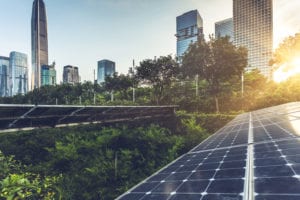And one that should be consigned to the annals of history
A green economy – what a paradox! Have not we – the industry – used up resources, polluted the environment, accepted the environmental impact of increased traffic, industrial food production, waste and population growth, the clearing of the rain forests, the plastic polluting the world’s oceans – done all of this to make profits, in the name of endless economic growth?
Yes. We have.
And now we suddenly want to be “green”?
Yes, we do. We have to.
- 99% of large-company CEOs agree that sustainability issues are important to the future success of their businesses (Harvard Business Review).
- 49% of global GDP, amounting to $39trn, is affected by binding Net Zero targets (Energy and Climate Intelligence Unit (ECIU)).
- 75% of investment managers agree that a company’s sustainability performance is an important factor when deciding whether to invest (MIT Sloan Management, Investing For a Sustainable Future).
And:
- 190 countries and the continent of Europe (the first continent to do so) have entered into a binding agreement to meet specific targets to achieve a climate neutral world.
- +1,800 companies across the globe are committed to extensive decarbonization.
- 631 investors managing $37 trillion in assets signed a statement at COP25 urging governments to step up efforts to tackle the global climate crisis (Global Investor Statement to Governments on Climate Change).
Microsoft has even pledged to become carbon negative by 2030, and by 2050 it aims to remove from the environment all the carbon the company has emitted either directly or by electrical consumption since it was founded in 1975.
You can find Schneider Electric’s climate goals and our plan for climate neutrality here
Until recently, nobody would have expected BlackRock boss Larry Fink to make the statement he released in January 2020:
“Climate change has become a defining factor in companies’ long-term prospects. (…) Research from a wide range of organizations – including the UN’s Intergovernmental Panel on Climate Change, the BlackRock Investment Institute, and many others, including new studies from McKinsey on the socioeconomic implications of physical climate risk – is deepening our understanding of how climate risk will impact both our physical world and the global system that finances economic growth.”
Today, all companies are confronted with this – not least because the capital market and reinsurers are focusing upon climate and environmental consequences.

How can we achieve economic success this century? Definitely not with the solutions from last century and those previous!
Climate change is the greatest challenge of our generation. Companies all over the world have been working for decades on developing solutions – and have made the relevant strategic decisions.
And yes: even then, we have to be economically successful! Our answer to the megatrends of globalization, climate change, urbanization and growing energy demand was – and still is – to invest in research and development.
The weakest point in our strategy and implementation determines our success as a company – or our failure. It’s no longer enough to lead in a technological field if this doesn’t include digital business models, resilient supply chains, sustainability and social responsibility.
In the near future, we’ll see that
- Measures will be prioritized that have an immediate positive effect on employment and contribute to sustainable development in line with the environmental aims outlined in the European Green Deal for 2030 and 2050.
- Existing obstacles to private sector investments in low-carbon and emission-free technologies, renewable energies, energy efficiency and circular economy will be eliminated and incentives for such investments will be created. The capital market will react!
- Tax reform and a comprehensive carbon pricing system will be created that will initiate an ambitious carbon pricing structure and be a central element in sending an effective signal to the market and, thus, lead to a reduction in emissions.
- The demand for sustainable, innovative and digital solutions will be promoted via, for example, renewal programs, public procurement and investments, as well as through increasing standardization at EU level.
- Digital technologies and sustainable financing will serve as prerequisites for the transition to a carbon-free, circular economy.
- Transparency regarding the sustainability of products and supply chains will take center stage.
The industrial sector is obliged to develop and implement workable solutions. In the same way that all of us and society as a whole have been asked to rethink and change our consumer behavior. Where we spend and invest our money has a decisive influence upon the entire ecosystem. We have seen an acceleration of these issues, particularly in light of the COVID-19 pandemic and the unprecedented lockdown of the economy. In all areas of business, society and politics.



